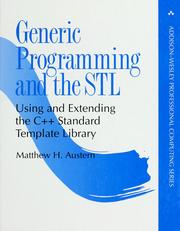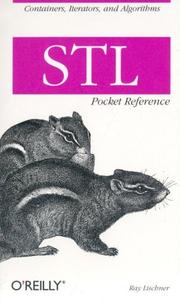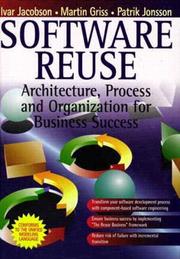| Listing 1 - 10 of 106 | << page >> |
Sort by
|
Book
Year: 2008 Publisher: [Place of publication not identified] Association for Computing Machinery
Abstract | Keywords | Export | Availability | Bookmark
 Loading...
Loading...Choose an application
- Reference Manager
- EndNote
- RefWorks (Direct export to RefWorks)
Book
Year: 2006 Publisher: [Place of publication not identified] Association for Computing Machinery
Abstract | Keywords | Export | Availability | Bookmark
 Loading...
Loading...Choose an application
- Reference Manager
- EndNote
- RefWorks (Direct export to RefWorks)
Book
Year: 2017 Publisher: Birmingham, England ; Mumbai, [India] : Packt,
Abstract | Keywords | Export | Availability | Bookmark
 Loading...
Loading...Choose an application
- Reference Manager
- EndNote
- RefWorks (Direct export to RefWorks)
This book breaks down the C++ STL, teaching you how to extract its gems and apply them to your programming. About This Book Boost your productivity as a C++ developer with the latest features of C++17 Develop high-quality, fast, and portable applications with the varied features of the STL Migrate from older versions (C++11, C++14) to C++17 Who This Book Is For This book is for developers who would like to master the C++ STL and make full use of its components. Prior C++ knowledge is assumed. What You Will Learn Make your own iterator types, allocators, and thread pools. Master every standard container and every standard algorithm. Improve your code by replacing new/delete with smart pointers. Understand the difference between monomorphic algorithms, polymorphic algorithms, and generic algorithms. Learn the meaning and applications of vocabulary type, product type and sum type. In Detail Modern C++ has come a long way since 2011. The latest update, C++17, has just been ratified and several implementations are on the way. This book is your guide to the C++ standard library, including the very latest C++17 features. The book starts by exploring the C++ Standard Template Library in depth. You will learn the key differences between classical polymorphism and generic programming, the foundation of the STL. You will also learn how to use the various algorithms and containers in the STL to suit your programming needs. The next module delves into the tools of modern C++. Here you will learn about algebraic types such as std::optional, vocabulary types such as std::function, smart pointers, and synchronization primitives such as std::atomic and std::mutex. In the final module, you will learn about C++'s support for regular expressions and file I/O. By the end of the book you will be proficient in using the C++17 standard library to implement real programs, and you'll have gained a solid understanding of the library's own internals. Style and approach This book takes a concise but comprehensive approach to explaining and applying the C++ STL, one feature at a time. Downloading the example code for this book. You can download the example code files for all Packt books you have purchased from your account at http://www.PacktPub.com. If you purchased this book elsewhere, you can visit http://www.PacktPub.com/support and register to have the code file.

ISBN: 0201309564 Year: 1999 Publisher: Reading, Mass. : Addison-Wesley,
Abstract | Keywords | Export | Availability | Bookmark
 Loading...
Loading...Choose an application
- Reference Manager
- EndNote
- RefWorks (Direct export to RefWorks)
Book
ISBN: 1450338100 Year: 2015 Publisher: New York : ACM,
Abstract | Keywords | Export | Availability | Bookmark
 Loading...
Loading...Choose an application
- Reference Manager
- EndNote
- RefWorks (Direct export to RefWorks)

ISBN: 0596005563 Year: 2004 Publisher: Sebastopol, CA : O'Reilly,
Abstract | Keywords | Export | Availability | Bookmark
 Loading...
Loading...Choose an application
- Reference Manager
- EndNote
- RefWorks (Direct export to RefWorks)
Book
ISBN: 1283453533 9786613453532 1849690790 9781849690799 1849690782 9781849690782 9781849690782 9781283453530 6613453536 Year: 2012 Publisher: Birmingham Packt Publishing
Abstract | Keywords | Export | Availability | Bookmark
 Loading...
Loading...Choose an application
- Reference Manager
- EndNote
- RefWorks (Direct export to RefWorks)
This is a concise, practical guide that will help you learn Generics in .NET, with lots of real world and fun-to-build examples and clear explanations. It is packed with screenshots to aid your understanding of the process. This book is aimed at beginners in Generics. It assumes some working knowledge of C# , but it isn't mandatory. The following would get the most use out of the book: Newbie C# developers struggling with Generics. Experienced C++ and Java Programmers who are migrating to C# and looking for an alternative to other generic frameworks like STL and JCF would find this book handy.
Generic programming (Computer science) --- Computer programming --- Computer software --- Reusability --- Microsoft .NET. --- Microsoft .NET Framework. --- Dot Net (Software framework) --- Microsoft .NET --- Microsoft .NET software framework --- .NET Framework

ISBN: 0201924765 9780201924763 Year: 1997 Publisher: New York ACM
Abstract | Keywords | Export | Availability | Bookmark
 Loading...
Loading...Choose an application
- Reference Manager
- EndNote
- RefWorks (Direct export to RefWorks)
Programming --- Reusability. --- Réutilisation --- Computer software --- 650 --- 654 --- AA / International- internationaal --- Reusability of software --- Reusable code (Computer programs) --- Software reusability --- Software reengineering --- Generic programming (Computer science) --- Reusability --- Theorieën en grondbeginselen. Management --- Informatieverwerking. Bureautica --- Computer software - Reusability.
Book
ISBN: 1484272951 9781484272947 1484272943 Year: 2022 Publisher: [California] : Apress,
Abstract | Keywords | Export | Availability | Bookmark
 Loading...
Loading...Choose an application
- Reference Manager
- EndNote
- RefWorks (Direct export to RefWorks)
Apply the latest editions of the C++ standard to the implementation of design patterns. As well as covering traditional design patterns, this book fleshes out new design patterns and approaches that will be useful to modern C++ developers. Author Dmitri Nesteruk presents concepts as a fun investigation of how problems can be solved in different ways, along the way using varying degrees of technical sophistication and explaining different sorts of trade-offs. Design Patterns in Modern C++20, Second Edition also provides a technology demo for modern C++, showcasing how some of its latest features (e.g., coroutines, modules and more) make difficult problems a lot easier to solve. The examples in this book are all suitable for putting into production, with only a few simplifications made in order to aid readability. What You Will Learn Use creational patterns such as builder, factories, prototype and singleton Implement structural patterns such as adapter, bridge, decorator, facade and more Work with the behavioral patterns such as chain of responsibility, command, iterator, mediator and more Apply functional design patterns such as the Maybe Monad Who This Book Is For This book is for both beginner and experienced C++ developers.
C++ (Computer program language). --- Software patterns. --- Computer software --- Reusability. --- Reusability of software --- Reusable code (Computer programs) --- Software reusability --- Software reengineering --- Generic programming (Computer science) --- Patterns, Software --- Development --- C++ (Computer program language)
Book
ISBN: 9783031185564 Year: 2023 Publisher: Cham : Springer International Publishing : Imprint: Springer,
Abstract | Keywords | Export | Availability | Bookmark
 Loading...
Loading...Choose an application
- Reference Manager
- EndNote
- RefWorks (Direct export to RefWorks)
This book is about software product lines (SPLs) designed and developed taking UML diagrams as the primary basis, modeled according to a rigorous approach composed of an UML profile and a systematic process for variability management activities, forming the Stereotype-based Management of Variability (SMarty) approach. The book consists of five parts. Part I provides essential concepts on SPL in terms of the first development methodologies. It also introduces variability concepts and discusses SPL architectures finishing with the SMarty approach. Part II is focused on the design, verification and validation of SMarty SPLs, and Part III concentrates on the SPL architecture evolution based on ISO/IEC metrics, the SystEM-PLA method, optimization with the MOA4PLA method, and feature interaction prevention. Next, Part IV presents SMarty as a basis for SPL development, such as, the M-SPLearning SPL for mobile learning applications, the PLeTs SPL for testing tools, the PlugSPL plugin environment for supporting the SPL life cycle, the SyMPLES approach for designing embedded systems with SysML, the SMartySPEM approach for software process lines (SPrL), and re-engineering of class diagrams into an SPL. Eventually, Part V promotes controlled experimentation in UML-based SPLs, presenting essential concepts on how to plan, conduct, and document experiments, as well as showing several experiments carried out with SMarty. This book aims at lecturers, graduate students and experienced practitioners. Lecturers might use the book for graduate level courses about SPL fundamentals and tools; students will learn about the SPL engineering process, variability management, and mass customization; and practitioners will see how to plan the transition from single-product development to an SPL-based process, how to document inherent variability in a given domain, or how to apply controlled experiments to SPLs.
Computer software --- UML (Computer science) --- Reusability. --- Unified Modeling Language (Computer science) --- Modeling languages (Computer science) --- Object-oriented methods (Computer science) --- Reusability of software --- Reusable code (Computer programs) --- Software reusability --- Software reengineering --- Generic programming (Computer science) --- Development --- Software engineering. --- Software Engineering.
| Listing 1 - 10 of 106 | << page >> |
Sort by
|

 Search
Search Feedback
Feedback About UniCat
About UniCat  Help
Help News
News